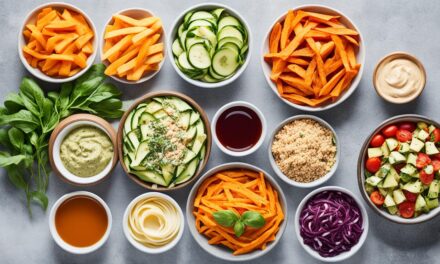Have you ever considered going on a gluten-free diet in hopes of shedding a few pounds? Well, you’re not alone. It seems like everywhere you turn, someone is raving about the benefits of cutting out gluten for weight loss. But is there any truth to this popular trend? Let’s find out.
Meet Sarah. She’s a busy working professional who has always struggled with her weight. Tired of constantly trying different diets and seeing little to no results, she decided to give the gluten-free lifestyle a shot. She heard that eliminating gluten could be the key to finally reaching her weight loss goals. With high hopes and a grocery cart full of gluten-free products, Sarah embarked on her new diet.
Key Takeaways:
- A gluten-free diet is not necessarily a key factor in weight loss, even if you don’t have celiac disease.
- Gluten does not directly cause weight gain, especially in individuals with celiac disease.
- Weight loss associated with a gluten-free diet may be due to other factors, such as healthier food choices and increased physical activity.
- A gluten-free diet can lead to nutritional deficiencies and be expensive compared to a regular diet.
- It is crucial to get tested for celiac disease before adopting a gluten-free diet.
Gluten-Free Diets and Weight Gain
Contrary to popular belief, weight gain is not a common symptom or consequence of celiac disease, an autoimmune disorder caused by gluten intolerance. In fact, individuals with celiac disease often experience weight loss or have difficulty gaining weight due to the damage to their intestinal lining, which impairs nutrient absorption. So, if you’ve been blaming gluten for those extra pounds, it might be time to reassess your assumptions.
But wait, you might ask, what about non-celiac individuals who adopt a gluten-free diet? Does gluten cause weight gain in them? Well, the truth is that there is limited scientific evidence to support the existence of non-celiac gluten sensitivity, a distinct clinical entity. So, weight gain should not be considered a major sign of non-celiac gluten sensitivity.
“Weight gain? Not a chance! In fact, it’s quite the opposite for us folks with celiac disease. And even for those going gluten-free without celiac, the science isn’t quite clear on whether it’s the gluten or something else causing the scale to budge.”
While some individuals may claim to have experienced weight gain after adopting a gluten-free diet, it’s important to consider other factors that may contribute to this phenomenon. It could be related to changes in overall dietary choices, such as opting for gluten-free processed products that are often higher in sugar and fat. Or it could be simply due to a higher caloric intake from gluten-free alternatives.
Weight Gain and Celiac Disease: A Complex Link
The relationship between celiac disease and weight gain is multifaceted. Let’s take a closer look:
- Malabsorption: The damage to the intestinal lining in individuals with celiac disease impairs their ability to absorb nutrients properly. This can lead to weight loss or difficulty gaining weight, rather than weight gain.
- Increased Appetite: Some individuals with undiagnosed celiac disease may experience increased appetite as their body tries to compensate for the nutrients it lacks. However, this increased hunger doesn’t necessarily translate to weight gain.
- Gluten-Related Inflammation: Inflammation triggered by the interaction between gluten and the immune system can affect the gut microbiota, which may indirectly impact weight. However, this doesn’t mean that gluten directly causes weight gain in individuals without celiac disease.
Ultimately, the idea that gluten causes weight gain is not well-supported by scientific evidence. So, if you’re considering a gluten-free diet solely for weight loss purposes, it’s essential to approach it with caution and consult a healthcare professional.
A gluten-free diet doesn’t necessarily mean you’ll gain weight. It’s all about understanding the complexities of celiac disease and gauging the scientific evidence accurately.
The Role of Gluten in Weight Loss
Despite the lack of scientific evidence supporting a direct link between gluten and weight loss, some individuals believe that eliminating gluten from their diet can help them shed pounds. However, it is important to consider other factors that may contribute to weight loss when adopting a gluten-free diet.
Gluten, a protein found in wheat, barley, and rye, has gained a reputation as a culprit for weight gain. But the truth is, it’s not the absence of gluten itself that promotes weight loss, but rather the overall changes in lifestyle and dietary habits that accompany a gluten-free diet.
“Going gluten-free doesn’t automatically equal weight loss. It’s the choices you make within a gluten-free diet that matter.”
Eliminating gluten from your diet often requires making healthier food choices, such as opting for fruits, vegetables, lean proteins, and whole grains that are naturally gluten-free. These nutrient-dense foods can contribute to weight loss because they are lower in calories and higher in fiber, which helps you feel full and satisfied.
Moreover, adopting a gluten-free diet may lead to reduced caloric intake through portion control. Many processed gluten-containing foods, like pasta and baked goods, can be high in calories. By eliminating these foods and focusing on whole, unprocessed alternatives, you can better manage your caloric intake and potentially lose weight.
Increasing physical activity is another important factor in weight loss. While going gluten-free won’t directly impact your physical activity levels, it may motivate you to explore new recipes, experiment with different types of exercise, and adopt an overall healthier lifestyle.
However, it’s worth noting that not everyone who eliminates gluten from their diet will experience weight loss. Everyone’s body is unique, and weight loss is a complex process influenced by various factors, including genetics, metabolism, and overall caloric balance.
| Gluten-Free Diet | Weight Loss | |
|---|---|---|
| Pros | May encourage healthier food choices | Can contribute to caloric deficit |
| Can promote portion control | May increase motivation for physical activity | |
| Cons | Potential nutritional deficiencies | No guaranteed weight loss |
| Higher cost of gluten-free products | Individual results vary |
In conclusion, while adopting a gluten-free diet may lead to weight loss for some individuals, it is important to focus on overall lifestyle changes, healthier food choices, and increased physical activity. Remember, the absence of gluten itself is not the key factor in weight loss. If you are considering a gluten-free diet for weight loss purposes, it is essential to consult with a healthcare professional or registered dietitian to ensure you are meeting your nutritional needs and maintaining a balanced diet.
Gluten-Free Diets and Nutritional Considerations
While a gluten-free diet can be beneficial for individuals with celiac disease or gluten intolerance, it’s essential to be mindful of potential nutritional deficiencies that may arise from eliminating gluten-containing foods. Gluten-free products often lack certain essential nutrients, such as fiber, folate, and iron, which are commonly found in whole grains. It’s crucial for you, while following a gluten-free diet, to ensure you’re getting these nutrients from alternative sources.
Table: Nutritional Comparison of Gluten-Free and Gluten-Containing Foods
| Essential Nutrients | Gluten-Free Foods | Gluten-Containing Foods |
|---|---|---|
| Fiber | Varies, often lower | High, especially in whole grains |
| Folate | Lower, may require supplementation | Good source in fortified cereals and bread |
| Iron | Lower, may require supplementation | Good source in fortified cereals and whole grains |
It’s also important to note that gluten-free products tend to be more expensive than their gluten-containing counterparts, which can be a financial burden for some individuals. However, there are ways to navigate this challenge. Look for affordable options, consider cooking from scratch using gluten-free ingredients, and focus on nutrient-rich whole foods like fruits, vegetables, lean proteins, and legumes.
Image:
“Adopting a gluten-free diet doesn’t mean you have to sacrifice essential nutrients. With proper planning and ingredient selection, you can maintain a balanced and nutritious gluten-free diet.”
Testing for Celiac Disease
So, you suspect that you may have celiac disease? Well, before you jump into a gluten-free diet, it’s essential to undergo proper testing. This will help you determine whether or not you have celiac disease and ensure an accurate diagnosis for appropriate treatment options.
Testing for celiac disease typically involves a two-step process. The first step is a blood test to check for specific antibodies that are associated with celiac disease. This test can help identify if your body produces antibodies in response to gluten consumption.
“Getting tested for celiac disease is like wearing a seatbelt in a car—it’s a precautionary measure that can save you from potential harm.”
If the blood test results are positive, the next step is a biopsy of the small intestine. During this procedure, a small sample of the intestinal tissue is taken for further examination. The biopsy can confirm the presence of celiac disease by identifying characteristic damage to the small intestine caused by gluten intolerance.
Don’t let the fear of testing scare you away—remember, knowledge is power. It’s important to get tested for celiac disease before adopting a gluten-free diet because eliminating gluten from your diet can temporarily mask the presence of antibodies in your blood, making it more difficult to get an accurate diagnosis.
Additionally, keep in mind that celiac disease can be hereditary, so it’s crucial to test family members who may also be at risk. Identifying celiac disease early can help them manage their health and lifestyle effectively.
Testing for Celiac Disease
| Testing Method | Description |
|---|---|
| Blood Test | A test that checks for specific antibodies associated with celiac disease |
| Biopsy | A procedure that involves taking a small sample of tissue from the small intestine to confirm the presence of celiac disease |
Remember, by getting tested for celiac disease, you’re taking a proactive step towards understanding your health and well-being. Knowledge gained from testing can guide you in making informed decisions about your diet and overall lifestyle.
Conclusion
So, you’ve learned that while a gluten-free diet may be necessary for individuals with celiac disease or gluten intolerance, it is not a magic solution for weight loss in those without these conditions. Say goodbye to the idea that gluten is the culprit behind those extra pounds, because scientific evidence does not support this claim.
If you suspect you have celiac disease or gluten intolerance, it is crucial to get tested for an accurate diagnosis and appropriate treatment plan. Relying on a self-diagnosis or adopting a gluten-free diet without medical guidance can lead to potential nutritional deficiencies and unnecessary expenses. Remember, not all health trends are suitable for everyone.
Before you jump on the gluten-free bandwagon, consider consulting with a healthcare professional to determine the best approach for your specific needs. They can provide insights on alternative diets that support weight loss or guide you through properly managing celiac disease or gluten intolerance. Your overall health and well-being should always be the top priority.
FAQ
Is a gluten-free diet the key to weight loss, even if you don’t have celiac disease?
Do individuals with celiac disease tend to gain weight?
Can a gluten-free diet promote weight loss through healthier food choices?
Are there nutritional considerations when following a gluten-free diet?
How can I determine if I have celiac disease?
Is a gluten-free diet necessary for weight loss if I don’t have celiac disease?
MORE SOURCES TO READ:
- https://www.ncbi.nlm.nih.gov/pmc/articles/PMC5439366/
- https://www.ncbi.nlm.nih.gov/pmc/articles/PMC6636598/
- https://www.cspinet.org/article/weight-gain-common-sign-gluten-sensitivity
![]()













Recent Comments